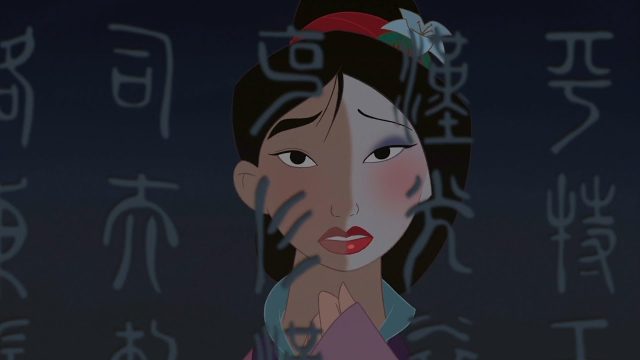The original plan for this movie was racist as hell. It was about a Chinese girl rescued from a life of oppression by a British man who would take her to live happily ever after. There is a lot of that if you read the history of the movie. It’s depressing to think that, in the Year of Our Lord 1998, with a strong history of people like Tyrus Wong working for the studio, people seem to have thought that the right way to introduce the first Chinese Disney heroine was to make her not want to be Chinese anymore or to suggest that the Chinese society was wrong. As it stands, it shows that it’s not a good fit for everyone, but it’s not as though a European woman in whenever-this-is-set would do all that great. Just ask Joan of Arc.
Fa Mulan (Ming-Na Wen, except when she sings, when she’s Lea Solanga) is supposed to meet with the matchmaker (Miriam Margolyes). She is lousy at the Womanly Arts. What’s more, the Huns have just invade China, and one man of every family must join the Chinese army. The only man of her family is her aging father, Fa Zhou (Soon-Tek Oh). To keep him from having to go, Mulan disguises herself as a boy, calling herself Ping.
The ancestors want her to come home, so they initially send the Great Stone Dragon. Who, um, falls apart. So the Tiny Annoying Dragon, Mushu (Eddie Murphy), goes in its place, only he decides that the way to win his place back among the guardians of the Fa clan is to make Mulan a war hero. She’s really not cut out for it. She is trained by Shang (BD Wong, with Danny Osmond singing), who dislikes her immediately because her attempt to be manly causes nothing but trouble.
The original story dates to some fifteen hundred years ago. This version uses design and story elements ranging back and forth about a thousand years of Chinese history. I wouldn’t want to be a woman pretty much anywhere in that time. It’s true that a woman incapable of finding a good husband and so forth would have problems in that era of China, but it’s not as though there aren’t lots of stories about people in lots of other places at the same time who are in trouble because of the expectations of their society and their failure to live up to it. The Mulan from the story merely went home, proving an example of traditional Chinese values.
Harvey Fierstein didn’t want to be in the movie. He is aware, even if apparently no one at Disney was, what the history of Asian actors in Hollywood looks like. I’m sure James Hong, who voices imperial counselor Chi Fu, has plenty of stories. Fierstein had to be told about the sheer number of Asian-American actors in the movie before he’d agree to be in it. And it’s true that, you know, George Takei and Gedde Watanabe aren’t exactly Chinese. It’s still better than a lot of other Hollywood movies about Asian people, after all, and this is animation, where it would be easy to disguise.
Speaking of disguises, it’s interesting how a movie about a woman who disguises herself as a man has a cast with so many men who’ve acted in drag in it. Fierstein. Wong. Watanabe, who did Pacific Overtures with Soon-Tek Oh. Eddie Murphy. I wouldn’t be surprised if you could dig into other men’s careers and find the same thing. I don’t know about Miguel Ferrer, who voiced Shan-Yu, but at this point, it feels as likely as not. It’s also a way of realizing that the movie’s got a heck of a cast.
Idina Menzel, on hearing that Ming-Na Wen didn’t sing her own songs, referred to it as a Marni Nixon situation. In fact, this was Marni Nixon’s final movie. She . . . provided someone else’s singing voice, because of course she did. This time, legendary voice actress June Foray; I did mention the “hell of a cast” thing, after all. It’s yet another aspect of the movie that involves the theme of disguises and deceit. Marni Nixon as someone else’s voice is a recurring fact in Hollywood history. That was what she was known for, after all.
Mulan is probably best known as the Disney princess who was never a princess. She’s not of noble birth here; her father was a great warrior, but he is still a commoner. Her love interest is the son of a great warrior, a general, but he’s not a noble, either, much less royal. Even when they marry, she isn’t anything close to a princess. That’s okay. She’s still an aspirational figure for a lot of little girls, no matter their ancestry.
Reward me for doing the work that needs doing by contributing to my Patreon or Ko-fi!

